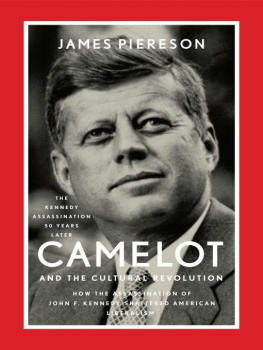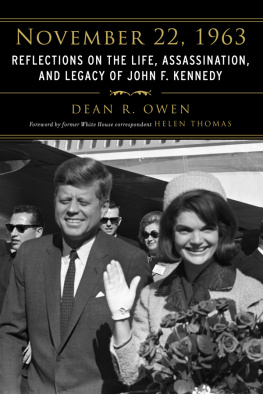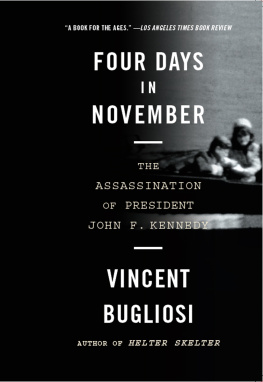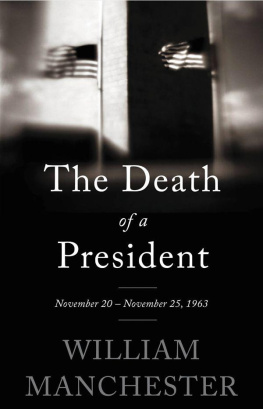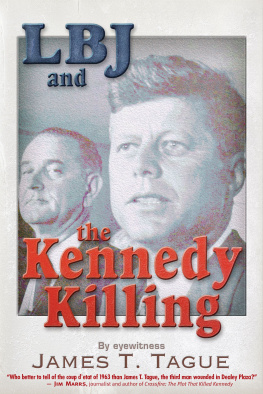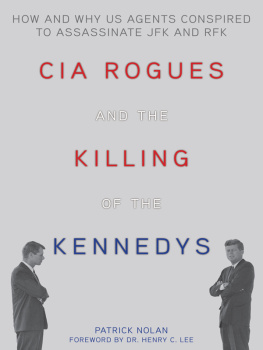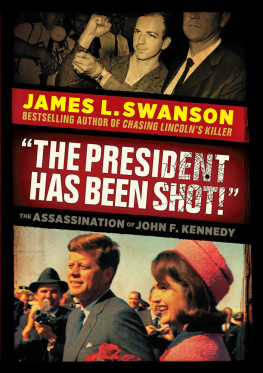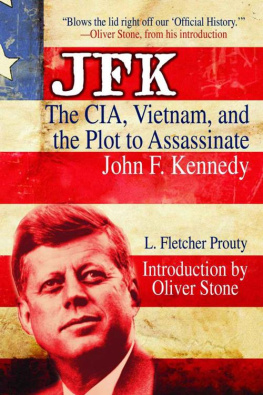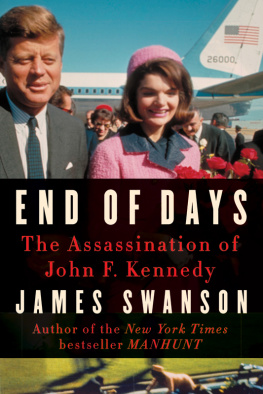Praise for
Camelot and the Cultural Revolution
Mr. Piereson [shows that] the assassination of Kennedy was more than a shot heard round the world. It was a shot that blasted into the liberal Weltanschauung, bringing on the enormities of the sixties and seventies. Mr. Piereson earns the gratitude of curious people, whom he fascinates.
William F. Buckley Jr.
It is one of the best accounts we have of why liberalismwhich owned the future in 1963fell from grace and has yet to recover.
The Wall Street Journal
James Piereson has written an idiosyncratic, provocative, and quite brilliant book. He puts the Kennedy assassinationor, rather, the lefts rewriting of history occasioned by the Kennedy assassinationat the center of liberalisms crackup in the 1960s in a way that no one, so far as I know, has done before. Ill go so far as to say this: Pieresons study will be indispensable to anyone, from now on, who seriously tries to come to grips with the last half-century of our history.
William Kristol, The Weekly Standard
In his book Camelot and the Cultural Revolution, Mr. Piereson has brilliantly added a new dimension to the bitter controversy that still rages over the JFK assassination: political perspective. It is much needed, if only to make some sense of the disputation over evidence that has gone on for over forty years.
Edward Jay Epstein, author of
Inquest: The Warren Commission and the Establishment of Truth
and Legend: The Secret World of Lee Harvey Oswald
Provocative and innovative... Piereson has made a major contribution to the literature on the Kennedy assassination.
Mark Moyar, National Review
A brilliant new book [that] makes us think again about events or personalities... to rethink again an entire era.
Catholic Light
[An] intriguing explanation of how... liberalism declined into the adolescent anger that is now its essence.
R. Emmet Tyrrell Jr., The American Spectator
James Piereson has succeeded in providing a fresh and persuasive way of understanding the political and cultural history of Americas last half-century.
First Things
A brilliant analysis... one of those rare works that actually change peoples minds.
John OSullivan, The American Conservative
Brilliant.
Jonah Goldberg, National Review Online
The book is a stunning success [that] reveals amazing historical facts.
Brian Domitrovic, Intercollegiate Studies Institute
Every now and then you come across a book that is so interesting, so clearly written and so carefully reasoned (and so brief) that you marvel at it.... This is a fine little book, deserving a wider audience.
Jim Delmont, Omaha City Weekly
FOREWORD TO THE 2013 EDITION
IT HAS NOW been fifty years since President John F. Kennedy was cut down on the streets of Dallas by rifle shots fired by Lee Harvey Oswald, a self-described Marxist, recent defector to the Soviet Union, and ardent admirer of Fidel Castro. The evidence condemning Oswald was overwhelming: the bullets that killed President Kennedy were fired from his rifle, the rifle was found on the sixth floor of the warehouse where he worked and where he was seen moments before the shooting, and witnesses on the street saw a man firing shots from that location and provided police with a description of the assassin. Forty-five minutes later, a policeman stopped Oswald on foot in another section of the city to question him about the shooting. As the policeman stepped from his squad car, Oswald pulled out a pistol and pumped four shots into him before fleeing to a nearby movie theater where he was arrested (still carrying the pistol with which he had killed the policeman). Two days later, Oswald was himself assassinated while in police custody by a nightclub owner distraught over Kennedys death. For understandable reasons, these events had a disorienting effect on the public mind.
For many who came of age during that era and were taken with Kennedys style and idealistic rhetoric, his very public murder, recorded in amateur films and news photos, was a shock that they could never quite get over. Returning to it again and again as the years passed, they could not help but feel that the disasters that followedthe war in Vietnam, the urban riots, the assassinations of Robert Kennedy and Martin Luther King, Nixons election and Watergatewere in some way connected to that irrational act of violence that claimed President Kennedys life. If somehow the act could be undone or at least explained or understood, or if blame for it could be fairly apportioned and punishment meted out, then the world might again be set right. But it could not be undone, and it proved to be singularly difficult to explain or understand, at least in terms satisfactory to the assumptions of the age. Before long the Kennedy assassination became encrusted with so many layers of myth, illusion, and disinformation that every attempt to understand it rationally failed to gain purchase.
The passage of five decades does not appear to have dimmed the publics fascination with President Kennedy and the Kennedy family, or allayed the confusion and controversy surrounding his assassination. According to Bowkers Books in Print, some 1,400 volumes about JFK and his assassination have been published since 1963, with dozens more bound to appear this year to mark the anniversary of his death. In a Gallup poll taken in 2003, American adults ranked JFK second behind Abraham Lincoln among all former presidents; among certain age groups, those in their teens and twenties when he was president, Kennedy ranked first. Few appear to believe that Lee Harvey Oswald shot President Kennedy or, if he did, that he acted alone. A recent poll found that a remarkable 75 percent of American adults believe that JFK was the victim of a conspiracy of some kind. This is hardly surprising, because most of the popular books published since the mid-1960s on Kennedys assassination have elaborated one or another conspiracy theory about the event. Right-wing businessmen, disgruntled generals, CIA operatives, and Mafia bosses are usually the villains in these hypothetical scenarios.a Few state the obvious: that President Kennedy was assassinated by a communist seeking to protect the Castro regime against JFKs efforts to overthrow it.
The public confusion surrounding the Kennedy assassination makes it unique among other politically consequential assassinations that have occurred throughout history. The assassination of Csar led to a long civil war and eventually to the defeat of the republican faction in Rome. The assassination of Lincoln complicated efforts to return the Southern states to the Union on the basis of civil rights for all. The assassination of Archduke Franz Ferdinand and his wife in 1914 ignited a series of events that led to a disastrous world war. No one doubts that these assassinations were consequential in the extreme: they produced powerful reactions against the assassins and the parties with which they were associated. The Kennedy assassination was different in that its consequences flowed from widespread public confusion about the meaning of the event and who was really responsible for it.
Camelot and the Cultural Revolution is one of the few books published on this vexed subject that attempts to tease out the political consequences of the Kennedy assassination and to explain how they may have flowed into the cultural revolution of the 1960s. The book is not concerned with the question of who killed JFK, since it is perfectly obvious to anyone interested in facts and evidence that Oswald shot President Kennedy and that he probably acted alone in doing so. There is as much evidence that Oswald shot Kennedy as there is for the conclusion that John Wilkes Booth shot Abraham Lincoln or that Gavrilo Princip assassinated the Austrian archduke.

